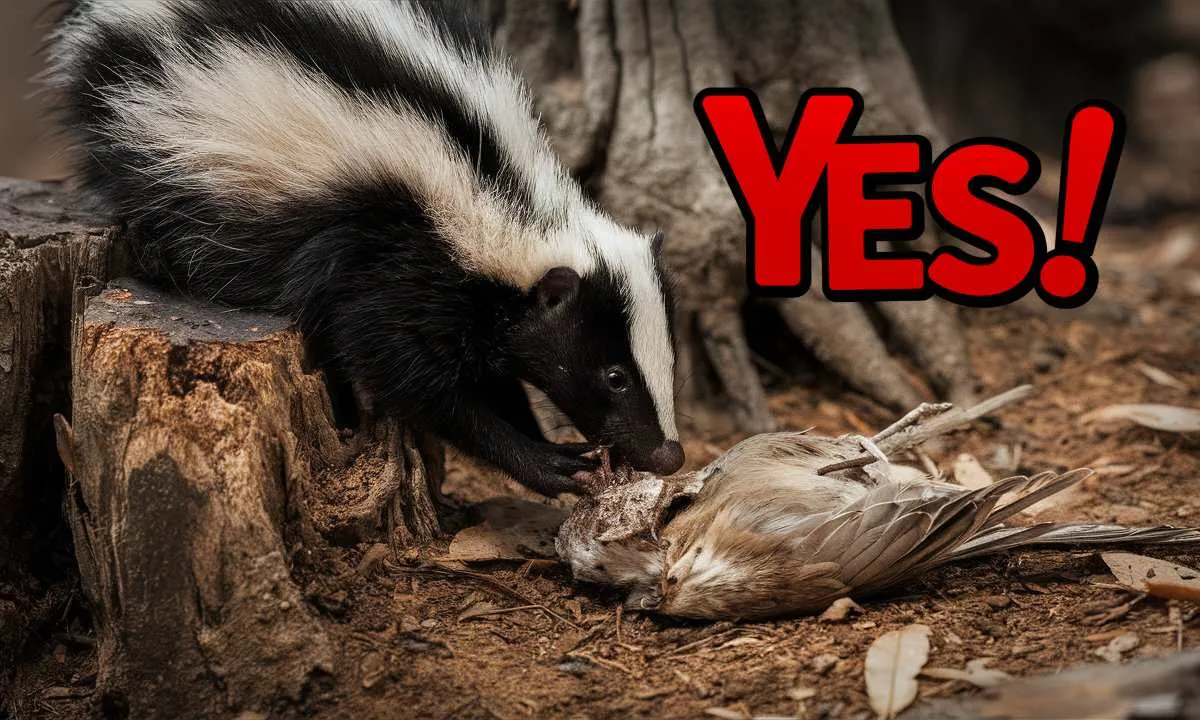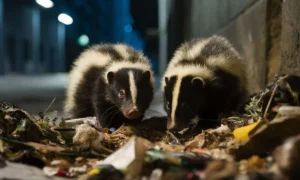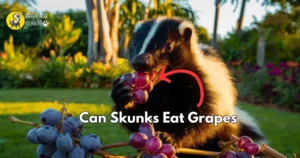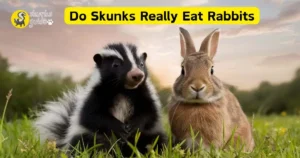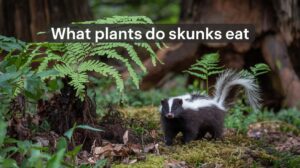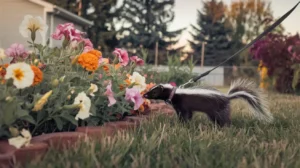Can Skunks Eat Carrion? Discover Their Diverse Diet
Yes, skunks do eat carrion. They are opportunistic feeders that consume a variety of foods.
Skunks, known for their distinctive black-and-white coloring and potent spray, are omnivores with a diverse diet. While they typically forage for insects, small rodents, fruits, and nuts, they won’t turn down an easy meal like carrion. This adaptability in diet helps skunks to survive in different environments, ranging from woodlands to urban areas.
Their role as scavengers is beneficial to the ecosystem, as they help in the decomposition process of dead animals. Understanding the dietary habits of skunks is crucial for homeowners and wildlife enthusiasts alike, as it can aid in effective wildlife management and reduce the likelihood of human-skunk encounters.
Skunk Diet
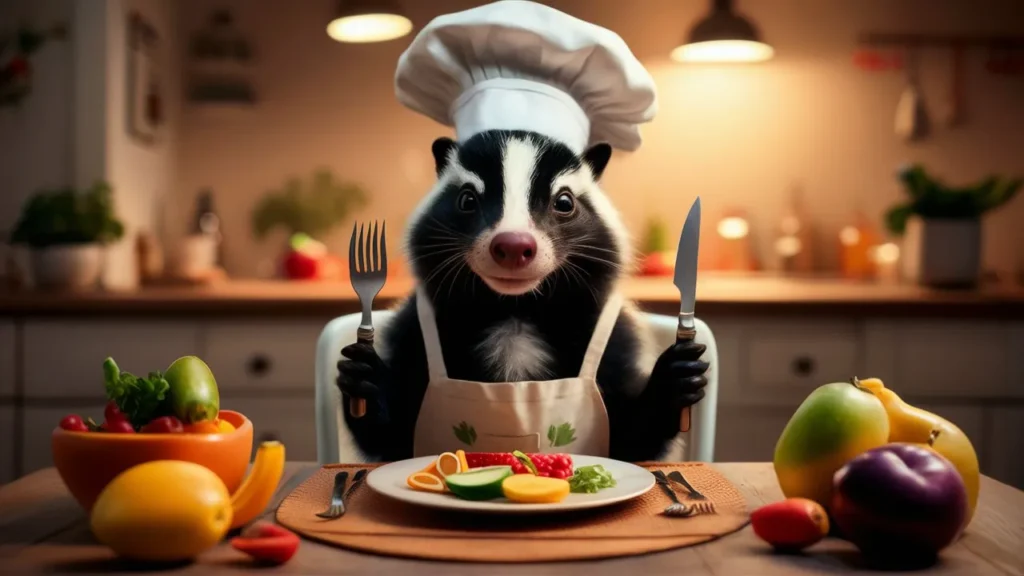
Ever wonder what a skunk’s diet consists of? These small mammals are known for their distinctive spray, but their eating habits are just as interesting. Skunks are not picky eaters and have a varied diet that can include carrion, which is the flesh of dead animals. Understanding what skunks eat helps us appreciate their role in the ecosystem.
Opportunistic Eaters
As opportunistic eaters, skunks take advantage of various food sources. They adapt their diet based on what’s available. This includes carrion, which they don’t hunt but will consume if they find it. Carrion is an important part of their diet, especially in winter when other food is scarce. Skunks contribute to the ecosystem by eating dead animals, thus cleaning up the environment. They also eat:
- Garbage
- Leftovers from other animals
- Pet food left outside
This behavior sometimes brings them close to human settlements. To avoid attracting skunks, it’s best to secure trash cans and not leave pet food outdoors. By doing so, we can limit skunk-human interactions and reduce the risk of them becoming a nuisance. Skunks are not out to cause trouble; they’re simply trying to survive by eating what they can find.
Carrion Consumption
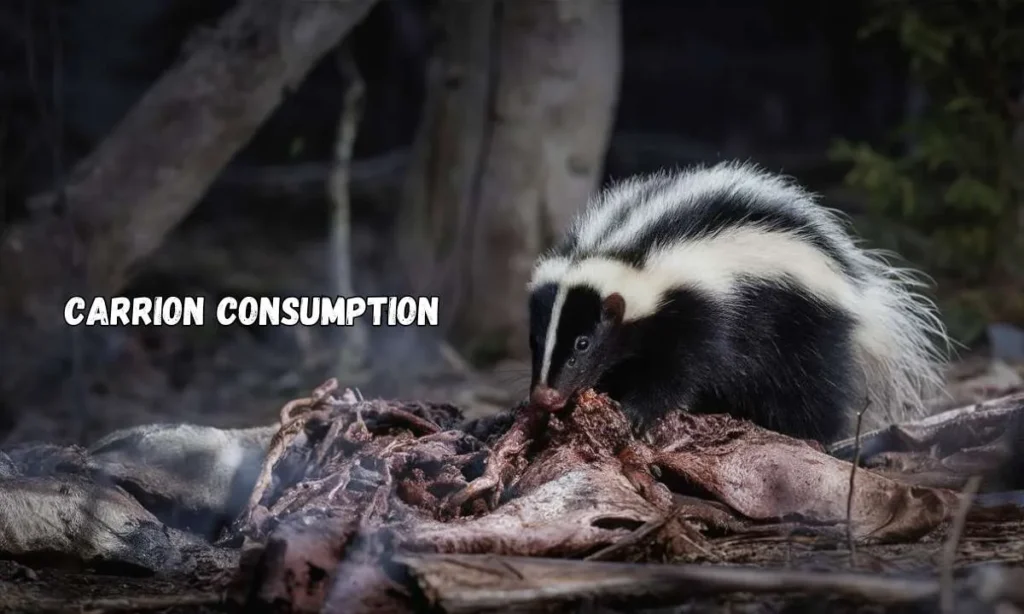
Many animals have evolved to include a variety of food sources in their diets, and skunks are no exception. Known for their distinctive black-and-white coloring and potent smell, skunks often surprise people with their diverse dietary habits. Carrion consumption is one such habit that highlights the skunk’s role as an opportunistic feeder. But do skunks actually eat carrion? Let’s explore this question and understand how it impacts their behavior and their role within the ecosystem.
Behavior Towards Carrion
Skunks exhibit interesting behaviors when it comes to carrion. They are omnivores, which means their diet includes both plant and animal matter. While they prefer fresh food, skunks will eat carrion when other food sources are scarce. Here are some key points about their behavior towards carrion:
- Skunks use their keen sense of smell to locate carrion.
- They are nocturnal foragers, often finding carrion by night.
- Carrion serves as an important food source during winter when other foods are hard to find.
When skunks approach carrion, they do so with caution. They must always be wary of predators or larger scavengers that may also be attracted to the carcass. Here is a simple table showing the types of carrion skunks might consume:
| Type of Carrion | Common Sources |
|---|---|
| Small Mammals | Rodents, Squirrels |
| Birds | Songbirds, Pigeons |
| Reptiles/Amphibians | Frogs, Lizards |
When a skunk finds carrion, it eats only what it needs. This prevents waste and ensures other scavengers can also benefit from the resource.
Role In Ecosystem
Skunks play a significant role in their ecosystems, particularly through their consumption of carrion. By eating dead animals, skunks help to clean up the environment and prevent the spread of disease. Their role can be summarized as follows:
- Skunks act as natural scavengers, aiding in the decomposition process.
- They help control the population of pests and vermin by consuming carcasses that might otherwise attract such creatures.
- Their feeding habits contribute to nutrient cycling, returning valuable nutrients to the soil.
Additionally, skunks indirectly support the food chain. By consuming carrion, they may leave behind remains that insects and other small scavengers can eat. Here is an overview of the benefits of skunk carrion consumption to the ecosystem:
| Benefit | Description |
|---|---|
| Decomposition | Accelerates the breakdown of dead animals. |
| Disease Control | Reduces potential breeding grounds for disease-carrying organisms. |
| Nutrient Cycling | Enhances soil fertility by returning organic matter. |
In this way, skunks contribute to maintaining the delicate balance of their habitats. Their role as both predators and scavengers is vital to the health and stability of their ecosystem.
Impact On Environment
Skunks are known for their strong smell, but they also eat dead animals, known as carrion. This has a big impact on the environment. They help clean it by eating what’s left behind. But, this can also bring some risks. Let’s dive into how their scavenger behavior affects our surroundings and the potential risks involved.
Scavenger Behavior
Skunks play a key role in our ecosystem. They eat dead animals, which helps keep our environment clean. This behavior is important because:
- It reduces disease spread by removing carcasses that could harbor harmful bacteria.
- It controls insect populations, as many bugs are attracted to and breed in decomposing bodies.
Here’s a simple table showing what skunks help control our environment:
| What Skunks Eat | Benefit to Environment |
|---|---|
| Dead animals | Reduces disease, controls insect populations |
| Leftover fruits & vegetables | Helps in composting, reducing waste |
By doing this, skunks contribute to a healthier and cleaner habitat for all living beings.
Potential Risks
While skunks help the environment, there are risks. Eating carrion means they sometimes come close to people’s homes. This can lead to:
- Spread of diseases to pets and humans. Skunks can carry rabies.
- Attracting other predators close to our homes, can be dangerous.
Also, skunks digging for carrion can harm:
- Lawns and gardens, making a mess.
- Small ecosystems, by disrupting the homes of other small creatures.
So, while skunks are helpful, we must be careful and manage our waste to keep them at a safe distance.
Risks And Concerns
Skunks, with their striking black and white coats, are known for their pungent spray. Yet, their diet often raises eyebrows as much as their smell. Indeed, skunks do eat carrion, which refers to the decaying flesh of dead animals. This behavior, while natural, brings about various risks and concerns. From disease transmission to human interactions, understanding the implications of skunks’ scavenging habits is vital for both public health and wildlife management.
Disease Transmission
Skunks, as scavengers, play a critical role in our ecosystem by consuming dead animals. However, this diet exposes them to numerous pathogens that can be harmful. A significant risk associated with skunks eating carrion is the transmission of diseases. Some of the diseases of concern include:
- Rabies: A viral disease affecting the central nervous system, which can be fatal if transmitted to humans or pets.
- Leptospirosis: Caused by bacteria, this disease can spread through contact with infected urine or carcasses.
- Canine Distemper: While it primarily affects dogs, skunks can also contract and spread this viral disease.
These diseases can spread in various ways:
| Disease | Transmission Method |
|---|---|
| Rabies | Bites or scratches from infected animals |
| Leptospirosis | Contact with contaminated water or soil |
| Canine Distemper | Airborne exposure or direct contact |
Understanding these risks is crucial for preventing outbreaks and ensuring the safety of both wildlife and human populations.
Human Interaction
When skunks venture near human habitats in search of carrion, they may encounter people or domestic animals, leading to potential risks. Human interaction with skunks can be problematic for several reasons:
- Spray: Skunks may spray humans or pets as a defense, causing discomfort and a lingering odor.
- Property Damage: Skunks can cause harm to properties while digging for food or shelter.
- Pet Conflicts: Pets may be bitten or scratched during encounters, risking disease transmission.
Preventive measures can help minimize risks:
- Secure trash bins to prevent skunks from foraging for food scraps.
- Install fencing to deter skunks from entering yards and gardens.
- Keep pets vaccinated and supervise them outdoors, especially at night.
By understanding these interactions and taking steps to prevent them, communities can reduce the risks associated with skunks eating carrion near human habitats.
Skunk Management
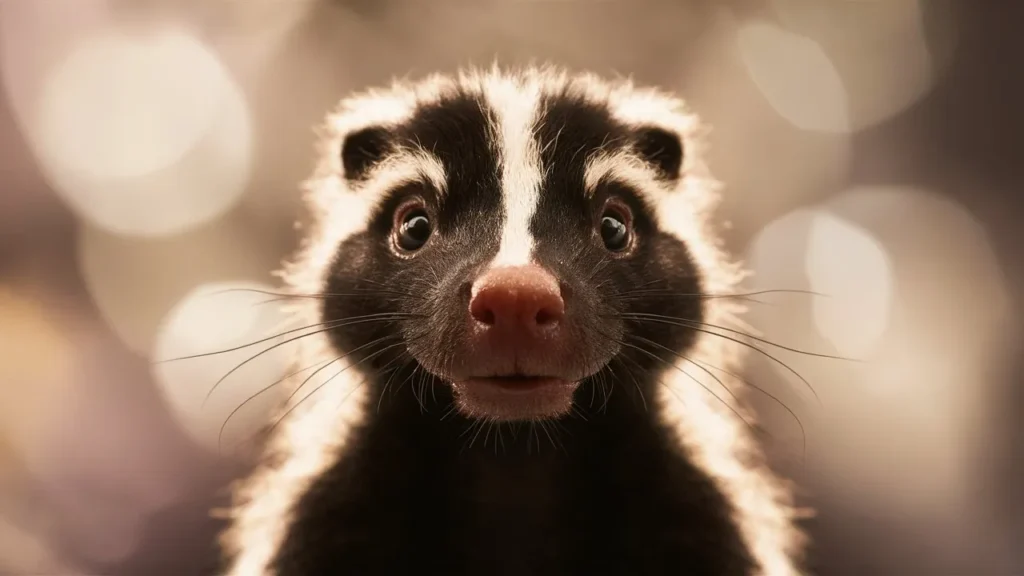
Have you ever wondered about the eating habits of skunks and how to manage their presence? Skunks are omnivores, which means they eat both plants and animals. One interesting aspect of their diet is that they consume carrion. Carrion is the decaying flesh of dead animals, which skunks find particularly appetizing. This dietary choice can lead to skunks scavenging in areas where dead animals are present, such as roadkill. As a result, skunk management becomes essential, especially to keep them away from residential areas and ensure peaceful coexistence.
Preventive Measures
Keeping skunks at bay involves several strategies. These furry creatures are known for their digging habits and strong sense of smell, which they use to locate food. To prevent skunks from turning your yard into their dining room, consider the following tips:
- Secure trash cans: Skunks love easy meals. Ensure garbage lids are tight and inaccessible.
- Remove food sources: Fallen fruit and pet food can attract skunks. Clear them regularly.
- Fence your garden: A sturdy fence can keep skunks out. Bury it deep to prevent digging.
These measures can significantly reduce the chances of skunk visits. Moreover, keep in mind that skunks are nocturnal. Motion-activated lights can deter them at night. Here’s a table summarizing additional preventive actions:
| Action | Benefit |
|---|---|
| Install motion detectors | Startles skunks, making your yard less appealing |
| Use skunk repellents | Odors that skunks dislike can keep them away |
| Seal entry points | Prevents skunks from nesting under decks or sheds |
Urban Encounters
City living brings humans and skunks closer together. Skunks may roam urban spaces in search of food. To manage these encounters:
- Stay calm: If you see a skunk, move away slowly. Sudden movements can trigger their defense.
- Avoid direct interaction: Skunks are shy and will not attack unless provoked.
- Keep pets safe: Ensure pets are vaccinated and supervised to prevent skunk interactions.
For urban dwellers, it’s vital to maintain a clean environment to discourage skunk visits. Trash management is key. Community efforts to secure bins and clean up roadkill promptly can help. Here’s what you can do:
| Task | Impact |
|---|---|
| Maintain cleanliness | Reduces food scraps that attract skunks |
| Collaborate with neighbors | Unified efforts amplify success in skunk management |
| Inform local authorities | They can assist with roadkill and provide further guidance |
By following these practices, we can minimize unwanted skunk encounters and promote a harmonious environment for all.
Frequently Asked Questions
Do Skunks Eat Dead Animals?
Yes, skunks do eat dead animals. They are omnivores and scavengers, meaning their diet can include carrion. This helps them fulfill their nutritional needs by consuming various food sources. Skunks often search for easy meals, and dead animals provide such an opportunity.
Do Skunks Eat Carcasses?
Yes, skunks will eat carcasses. They are omnivores and often scavenge, including consuming carrion as part of their diet.
Do Skunks Eat Rotten Meat?
Skunks are omnivores and may consume rotten meat if food is scarce. They typically prefer fresher food sources but will scavenge when necessary.
Conclusion
Skunks exhibit diverse dietary habits, with carrion featured on their menu. They aren’t picky eaters and will readily scavenge when the opportunity arises. Understanding their feeding patterns can help in managing encounters with these creatures. Remember, respecting wildlife and their ecosystems is crucial for conservation efforts.
Keep exploring the fascinating world of skunks and their survival strategies.

